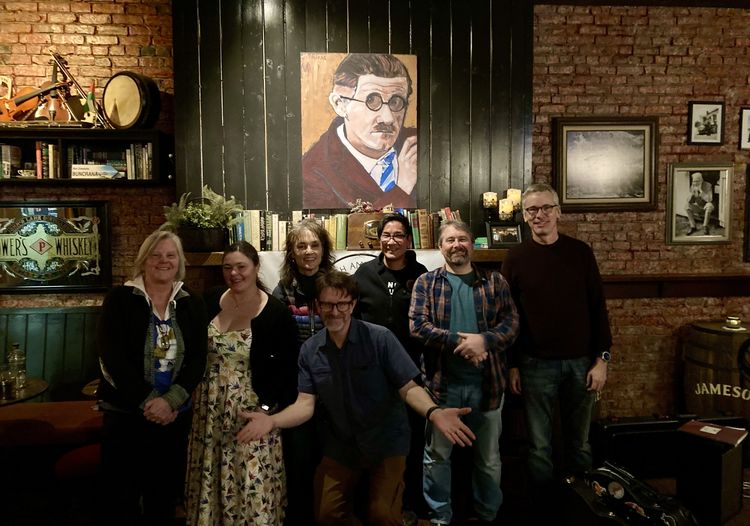Maria Deasy and Jack DiMonte.
Salon Diary / By Karen Daly
The late November IAW&A Salon at the Cell co-hosted by Nancy Oda and Kathleen Walsh D’Arcy featured informative presentations about food and drink, a tribute to the generosity of the Choctaw, plus music and an engaging theater piece.
Wonderful actors Maria Deasy and Jack DiMonte performed a scene from Thom Molyneaux’s, “B’way Chekhov’29,” delighting the audience with the humor and humanity of Chekhov characters. Says Thom: “The play answers the question, (which nobody’s ever really asked), “What would ‘The Seagull’ be like if Anton Chekhov hadn’t been a Russian playwright, in 1895, dissecting the citizens of the Moscow theatre and literary world, but an American playwright, in 1929, writing about Broadway musical comedy stars, popular writers and assorted hip New Yorkers?”
Genealogist and food expert Bridget Bray taught us about the “Recipes of 19th Century Ireland.” Drawing on her unique research, she showed recipes, how they were recorded, the equipment and vessels used to cook and present food, and the food consumed by different social classes.
Ray Lindie’s story, “The Beefeater Martini,” took place when he was a young actor tending bar at the fabled hangout Elaine’s. After meticulously making a Beefeater Martini for a southern gent who pronounced it “marvelous,” Ray learned that his customer was his favorite playwright, Tennessee Williams.
Also in the drink department, W. Jay Wanczyk reported on the recent “The First New York Irish Whiskey Festival” where 25 distillers from across Ireland offered samples of their wares. We don’t know how many Jay sampled, but he provided some charming whiskey history and lore, including that of the Glendalough, distillery near the site of St. Kevin’s monastery, adding quotes on the virtues of whiskey from Joyce, Steinbeck, Mencken and W.C. Fields.
Back in our fold after taking time off to concentrate on his fiction, Tom Mahon created a moving video about the Native American Choctaw tribe that endured a brutal forced migration in the 1830s to Oklahoma, known as “The Trail of Tears.” Nevertheless, when they learned of the Famine occurring in Ireland in 1840s, they donated the equivalent of several thousand dollars to help suffering people, who they’d never seen. (https://www.choctawnation.com)
Maureen Hossbacher shared an entertaining excerpt from an essay linking her Irish mother’s plain cooking—she was busy organizing Irish-American activities—and Maureen’s foray into the realm of professional haute cuisine á la the famous Escoffier methods. Maureen realized that Escoffier’s techniques reflected back to her mother’s. The piece appears in the Winter 2019 issue of Passager magazine.
As we always close with music, pianist Matthew Paris played a beautiful song by that great Irish-American entertainer George M. Cohan, “Life's a Funny Proposition After All.”
There is a Salon tonight at Bar Thalia, 2537 Broadway (at 95th Street), at 7 p.m. The special Christmas Salon will begin at 7 p.m., on Tuesday, Dec. 17 at the Cell Theatre, 338 West 23rd St, New York, NY 10011 (btw. 8th-9th Aves.).









